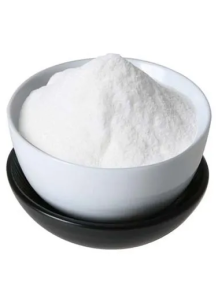Vitamin C: Vitamin C powder, L-ascorbic acid type, smaller than 300 microns (high purity), makes the skin look brighter. Helps soften wrinkles Helps stimulate the creation of collagen. and is an antioxidant
Vitamin C, type L-ascorbic acid, should not be mixed directly with water. Because oxidation will occur and cause damage.
The formula must always include Disodium EDTA to bind the charge when mixing L-Ascorbic Acid in water because Iron, Copper, Nickle Salts can destroy L-Ascorbic Acid.
Differences between each type of Vitamin C (L-Ascorbic Acid)
1. Vitamin C (L-ascorbic acid) (Standard) has normal powder size (smaller than sugar. But bigger than salt) is a product that focuses on saving.
2. Vitamin C (L-ascorbic acid) (Fine) has a small powder size (Fine), with the average size being in the range 200-300 micron
3. Vitamin C (L-ascorbic acid) (Ultra-Fine) has an extra small powder size (Ultra-Fine) with a size smaller than 45 microns being the smallest size.
Vitamin C, any grade of Ascorbic Acid, is not stable. When dissolved in water But it is more effective than Vitamin C in other forms.
Differences between each type of Vitamin C that the company sells:
1. Ethyl Ascorbic Acid : Vitamin C, soluble in water, highly stable, easy to mix, moderately effective. In terms of brightness (whitening)
2. Perfect-C™ (Ascorbyl Tetraisopalmitate) : Vitamin C dissolves in oil. Moderately stable High efficiency both wrinkles (anti-oxidant), radiance (whitening) and softness (collagen level) of the skin
3. Ascorbyl Glucoside (AA2G™, Stable Vitamin C) : Vitamin C is soluble in water and has moderate stability. Has a complex mixing process (pH level must be adjusted appropriately) and is highly effective in brightening (whitening) and wrinkles (anti-oxidant).
4. Vitamin C (L-ascorbic acid) Ultra-Fine , Vitamin C (L-ascorbic acid) Fine : Vitamin C dissolves in water, can dissolve in water very quickly and disperses very well. has low stability There are complicated mixing steps. High efficiency both sides wrinkles (anti-oxidant), radiance (whitening) and softness (collagen level) of the skin
5. Vitamin C (L-ascorbic acid) : Vitamin C is water soluble and has low stability. There are complicated mixing steps. High efficiency both sides wrinkles (anti-oxidant), radiance (whitening) and softness (collagen level) of the skin
6. Stabilized Vitamin C (Natural-C Glycol™) Serum : Ready-made vitamin C base, highly stable. But cannot adjust or add other ingredients. Because it will affect the stability of the bass. High efficiency both wrinkles (anti-oxidant), radiance (whitening) and softness (collagen level) of the skin
7. Magnesium Ascorbyl Phosphate (MAP) : Vitamin C, water soluble , highly stable, easy to mix, moderately effective. In terms of brightness (whitening)
8. Sodium Ascorbyl Phosphate (SAP) : Vitamin C, water soluble , highly stable, easy to mix, moderately effective. In terms of brightening (whitening), it is similar to MAP.
9. Vitamin C Ester (Ascorbyl Palmitate) : Oil-soluble vitamin C. Suitable for use as an anti-oxidant in oil formulas. It has little efficiency in other areas. Compared to other forms of Vitamin C
It is recommended to use Protec™ OX and Protec™ UV in the formula to help protect Vitamin C from quality deterioration.
Usage: For wrinkle reduction or whitening products to whiten the skin in the form of gel, serum, lotion or cream.
Mixing method: Mix in the final step. The temperature of the cosmetics must be lower than 30 °C and the pH between 2.0-4.0 (FDA requires that cosmetics applied to the skin must have a pH of at least 3.5).
Usage rate: 3-15% (3% for reducing general wrinkles, 15% for whitening the skin)
Product appearance: pure white powder
Solubility: Can dissolve in water May need to use a little heat in the short term, 1-3 minutes (50-70 °C to help dissolve)
INCI Name : L-Ascorbic Acid (Grade: Fine)



